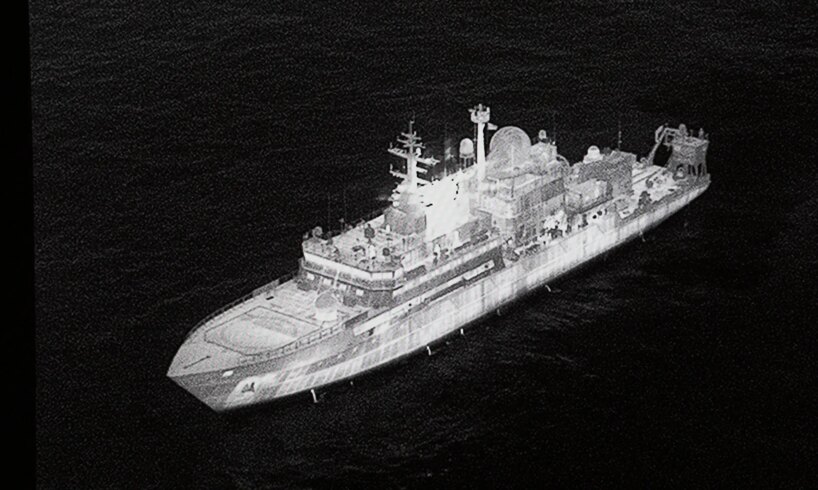
Defence Secretary John Healey condemns the Yantar’s actions as ‘deeply dangerous’ and says Britain is poised to react.
Published On 20 Nov 202520 Nov 2025
Click here to share on social media
share2
The United Kingdom has warned it is ready to use “military options” if necessary after a Russian spy ship that has spent weeks on the edge of British waters directed lasers at British pilots sent to monitor the vessel.
In a speech in London on Wednesday, British Defence Secretary John Healey condemned the Yantar’s actions against royal air force (RAF) pilots as “deeply dangerous” and said Britain is poised to react depending on the vessel’s next move.
Recommended Stories
list of 3 itemsend of list
The defence secretary said a UK naval frigate and RAF P-8 planes had been deployed to monitor the ship, which is designed for intelligence gathering and mapping undersea cables, as it sailed in waters north of Scotland.
“My message to Russia and to [President Vladimir] Putin is this: We see you. We know what you’re doing. And if the Yantar travels south this week, we are ready,” Healey said.
“This is the first time we’ve had this action from Yantar directed against the British RAF. We take it extremely seriously,” he added.
Healey continued that he had changed the navy’s rules of engagement to allow it to “monitor more closely” the vessel’s activities.
“We have military options ready should the Yantar change course,” he said.
Britain’s air and naval forces routinely shadow potential threats near its territorial waters and airspace. Incursions by Russian vessels and submarines have become more frequent since Putin launched his invasion of Ukraine in 2022.
In a statement responding to Healey’s accusations, the Russian embassy in London accused the British government of being “Russophobic” and “whipping up militaristic hysteria”.
Responding to what it described as “endless accusations”, it said Moscow’s “actions do not affect the interests of the United Kingdom and are not aimed at undermining its security”.
“We are not interested in British underwater communications,” it said, urging Britain to “refrain from destructive steps that exacerbate the crisis phenomena on the European continent”.
The Yantar, which is designed to conduct surveillance in peacetime and sabotage during times of war, according to British officials, also investigated the UK’s defences in January as it sailed through the English Channel.
The royal navy dispatched two vessels to monitor the spy vessel, which Healey said was “loitering over UK critical undersea infrastructure” before it departed for the Mediterranean.
Kremlin-linked vessels, part of Russia’s so-called shadow fleet of sanctions-evading oil tankers, have been accused of carrying out attacks on pipelines and cables as a new form of underwater hybrid warfare.
In December, Finnish authorities seized a Russia-linked ship on suspicion that it intentionally damaged an undersea power cable in the Baltic Sea between Finland and Estonia.
Healey’s warning also came as he made the case for increased defence spending in the face of threats from Russia, China and Iran before the unveiling of Britain’s new budget on November 26.
In June, Britain pledged to increase defence spending to 5 percent of its gross domestic product by 2035, more than double last year’s 2.3 percent and in line with most other NATO nations.
As part of that, Healey said the UK plans to develop “13 potential sites” to manufacture munitions and explosives as part of a 1.5-billion-pound (about $1.95bn) investment plan to create more than 1,000 jobs.
“This is a new era of threat. It demands a new era for defence, an era of hard power, strong allies and of sure diplomacy,’’ Healey said. “And as the threat grows, Britain must step up, and we are.”





